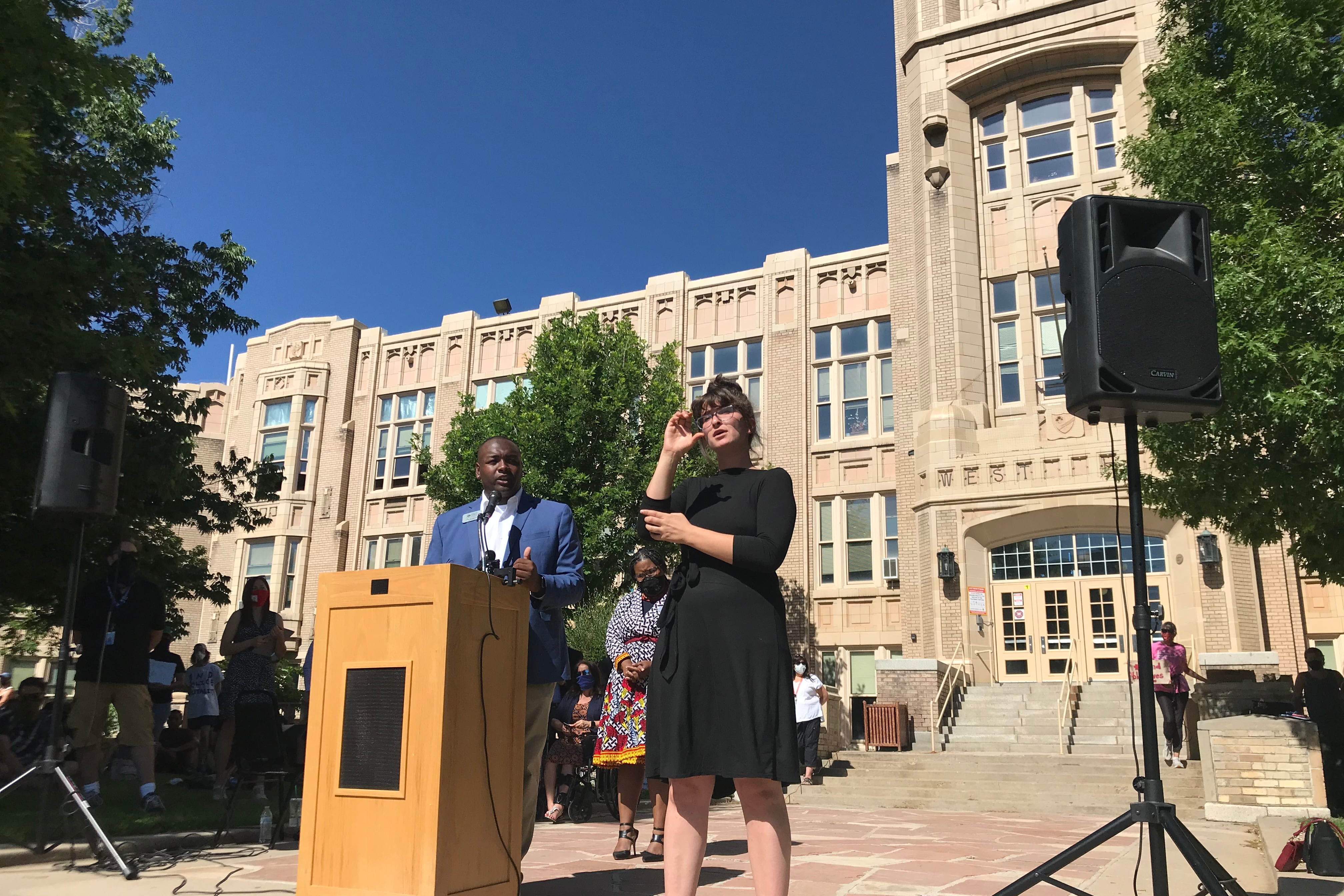The Denver school board could vote next week on a resolution that would remove police officers from the city’s public schools by the end of 2020.
A majority of school board members — four of the seven — showed up in support of the resolution at a press conference Friday morning on the steps of Denver’s West High School, about a mile from the state Capitol, where protests against racist policing have continued for more than a week. The protests were sparked by the killing of an unarmed black man, George Floyd, by a white police officer in Minneapolis last week.
Denver school board Director Tay Anderson, who has helped lead the protests, said watching Denver students who were participating get hit with tear gas and shot with foam bullets by police attempting to disperse protesters “was my breaking point.”
“We want to be able to have a school system where students are greeted with school nurses, with full-time mental health supports,” he said, “and not the Denver Police Department.”
The call to remove police from schools is gaining traction nationwide. Earlier this week, the Minneapolis school board severed ties with that city’s police department, and the superintendent in Portland, Oregon, said he was “discontinuing” his district’s school resource officer program.
Police have served in Denver schools as “school resource officers” since the 1990s. A contract between the city and the school district assigns 18 officers to Denver middle and high schools. The city and district split the cost; Denver Public Schools was slated to pay $721,403 for the school resource officers this past school year.
The resolution, the full text of which is not yet public, would direct schools Superintendent Susana Cordova to end that contract, Anderson said.
Cordova was also at the press conference. She said she’s committed to doing her part “to bring about the change that’s needed.” But she also referenced the positive relationships some students have with school resource officers, and said the district must think about student safety in addition to “the urgent and absolute need to end the school-to-prison pipeline.”
Denver’s 12,000 black students are more likely than white students to be suspended, expelled, handcuffed, or referred to law enforcement, statistics show. Most of the 4,500 tickets issued and arrests made at school since 2014 have been of black or Latino students, Anderson said.
Board Vice President Jennifer Bacon co-authored the resolution. She and Anderson are the two black members of a diverse board that also includes white and Latina members.
“Even though we have been able to move quickly and seize an opportunity, I do want to say we no longer have time to wait,” Bacon said. In explaining why, she referenced the amount of time a police officer kneeled on Floyd’s neck as he said he couldn’t breathe.
“It only took a minute — or 8 minutes and 46 seconds — to decide if someone should live.”
The board could vote on the resolution Thursday, Anderson said. In addition to ending the district’s contract with the city’s police department to provide school resource officers, Anderson and Bacon said it directs the superintendent to start a community process by Aug. 30 to create “an alternative safety plan” for the district’s more than 200 schools and 92,000 students.
Denver Public Schools has its own force of more than 100 armed and unarmed campus security officers. The resolution would not remove them from schools. Anderson also stressed that schools can continue to call the Denver police if an incident warrants it.
Asked whether school resource officers are needed to protect schools from active shooters, Anderson said no. Having police on campus can provide “a false sense of hope,” he said, noting that students have been killed in school shootings at schools that had officers.
The Denver teachers union spoke in support of the resolution, as did Padres & Jóvenes Unidos, a community group that for years has been pushing Denver to rid schools of police.
Teacher Monica Hunter, one of the founders of the union’s black educators caucus, recalled the pain of having to explain to her 7-year-old daughter why she was going to protest. She said her daughter asked: “Can’t we just buy them bagels? And then will they like black people?”
“Until we don’t have to have those conversations anymore, I’m here to tell you that our work is not done,” Hunter said. “Until the school-to-prison pipeline is eradicated, our work is not done.”
Jhoni Palmer, who graduated from Denver’s East High School last month, told the crowd that she saw black and brown students treated like hazards in school, not humans.
“Students of color,” Palmer said, “deserve more than broken promises, handcuffs, and juvenile records.”
Below, listen to Palmer speak.
Correction: An earlier version of this article cited incorrect information from Denver Public Schools that school resource officers were first introduced into Denver schools in 2004. Police officers have been present in Denver schools since the 1990s.






